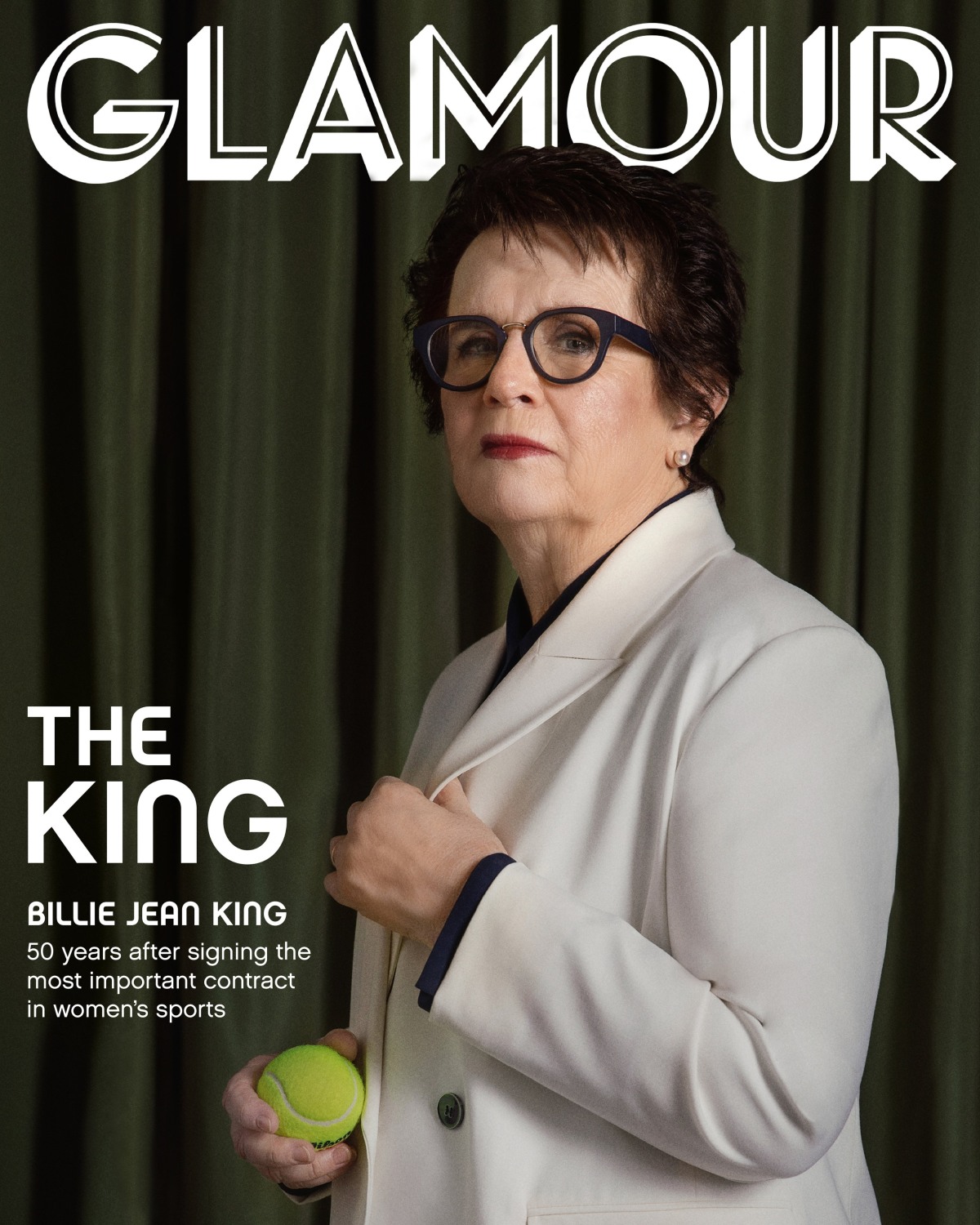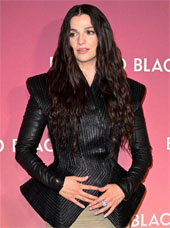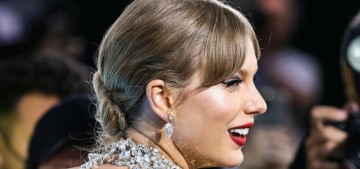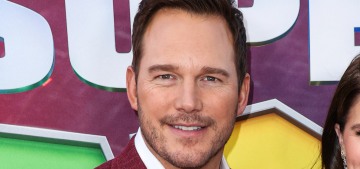I love that Glamour put Billie Jean King on their October cover. This year marks the 50th anniversary of “The Original Nine,” the nine women who defied the tennis organizations around the world and created their own women’s tennis tour. In 1970, it was called the Virginia Slims Tour, named after the cigarette company who sponsored the events. That tour morphed into the Women’s Tennis Association (WTA) in a matter of years. Billie Jean King was seen as the leader of the group – she was outraged by the wide disparity in prize money between men and women in tennis. When she tried to work within the system and convince the men that they should be paid equally, the dudes basically patted her on the head and told her to go away, and no one wanted women’s tennis anyway. She called their bluff and 50 years later, nine of the ten highest-paid female athletes are tennis players. BJK built a thing that lasted and thrived. You can read the Glamour cover story here. Some highlights:
Why she fought for equal prize money: “Money helps women have power.”
Her first tennis lesson as a kid: “I decided to be number one, at the end of that lesson. I knew what I wanted to do with my life.”
She knew she wanted to change the sport: “I didn’t know the word platform at 13,” King says. But she did know that if she wanted to have a real impact, she’d need clout. “I knew that as a girl, I would have it tougher. I knew that I was not Black or of color, so I knew that made my life a little easier. But I thought I had to be number one or no one would listen.”
Demanding bigger prize money to get attention for equal pay as an issue: “I want to make over $100,000. And I’m going to have to say that publicly, because I want people to notice it and start following the tour. I just knew if they had a reason to start watching how much money I was making, that would help the tour.”
Women need to talk about money: Even in our “evolved,” modern era, King talks about money in a way that’s liable to make some women cringe—frequently, shamelessly, and without apology. Halfway through our interview, she interrupts the conversation to lean into the camera and ask if we think we’re being paid fairly. Do we know what our male counterparts make? Did we negotiate for more when we took our jobs? “Are you getting the same? Or not? I think women need to talk about money a lot more and want to make a lot of money. People have to invest in women. And I don’t mean just women investing in women; I mean everyone. If you help make it right for women, you’ll make the world a better place.”
The Original Nine knew that the generations who came after them would reap the benefits: “Remember, we come from the $14-a-day group. We knew we weren’t going to make the big bucks. I didn’t even make $2 million dollars when I retired at 40—Serena [Williams] is at $93 million and still counting.”
The Glamour piece goes deep into the history of just how revolutionary it was and how other sports are still struggling with how to develop more equality between the men’s and women’s games. Tennis Channel has been spotlighting the stories of the Original Nine for the past month, and I really love it. I wish they would make the story into a movie, instead of the “Battle of the Sexes” match. I get that the match against Bobby Riggs was a huge cultural moment too, but BJK literally did that to raise more awareness of women’s tennis and the women’s tour!!
In 1970, @BillieJeanKing and 8 other women’s tennis players sent the world a clear message: pay women fairly or prepare for one hell of a fight. https://t.co/6ppc5FFcmR pic.twitter.com/EtfBfKj754
— Glamour (@glamourmag) September 23, 2020
Photos courtesy of Getty, cover courtesy of Glamour.












I love her and she’s right. I recently was negotiating for more money, which I hate to do but did in part because I know women need to do it more.
It is so painful to try and talk about money, especially with co-workers. But I’m glad I’ve had a few convos at happy hours (pre-covid days) with male & female co-workers that made me feel better about where I’m at in my company.
I didn’t know about the Original 9. Billie Jean King is such an impressive and inspiring woman.
Is she is difficult?
Does she have an incredible and dangerous level of self-belief?
Miss King, YOU GO GIRIL, and do not ever stop!
I owe this lady and I humbly bow down to pay proper homage!
She’s right, to be honest. King may be talking about it on a micro scale, but it is the largest and most pressing issue in terms of how society devalues some groups over others, particularly in the era of industrialized capitalism. It’s something that I feel a lot of women and minorities are afraid of discussing because they view it as gauche, but the hard reality is that is where you’ll find improved gender and race/ethnic equality. When you start correcting the mechanisms by which the work of those groups oppressed via socioeconomic mechanisms, you start removing the burden of that inequality, and a large part of that is because poverty and finance is one of the most effective tools of power societies use to limit the voices of groups within them.
It’s one of the reasons why I’ve come around to things like UBI or reparations in my older adult years because once you give these people the boost up, people at the top increasingly have less ability and authority to silence them – and more importantly, they have to DEAL with them, so they can’t keep holding them to a distant concept. Imagine a world where things like domestic labor are finally valued. Imagine a world where the poorest ethnic groups are given a leg up to start seriously competing in the American economy and can establish financial net worth through the purchase of homes and cars, the elimination of debt. The more you engage in these systems and move up the socioeconomic ladder, the more you become keenly aware of how people at the bottom are kept there.
This story means such a lot to me. For years, I kept Barbara Stanny’s book ‘Secrets of Six Figure Women’ next to me, and and read it over and over, having to really put in a lot of very painful work t o address the mental, social and emotional issues I had developed around earning money, and and acknowledging my worth in economic terms. It was worth it, and it was a journey, and I made it, but that book completely opened my eyes, and forced me to see my attitudes and actions for what they were, and where they came from. I just thank all those women like Billie Jean King who came before and showed the way and fought for us. Yes, there are powerful vested interests who have a big stake in keeping wage inequality in place.
“people didn’t want women’s tennis anyways” – that seems to be the argument for women’s soccer, basketball, all these things. Like promote them and people will watch.
Good for you Billie Jean!
BJK had a huge impact on me growing up. I was in the fourth grade when her match with Bobby Riggs was played. My young, female teacher, and my older, male gym teacher had a bet on the outcome of that match. Who ever lost, had to let the winner shave their head bald in front of the whole school. Back then, it consisted of 4th,5th and 6 grades, Around 70 kids total. We all cheered as she gleefully shaved his head, and made the statement to all 21 girls in the room ” Girls, remember you can do anything a man can do, and sometimes better!” The man who’s head she shaved is Luke and Murphy Jensen’s (French open champs) father! I have followed BJK through her whole career, and tennis is the one sport I do not play.
I have loved Billie Jean King since i was a little girl. My mom would make us watch her matches on TV and took us to see her play when the Slims Tour was in town. Martina too. They are strong, wonderful women who fought for so much and helped make all our lives easier.
This is great, I’ve admired her for years and I really want to read the full article. Go Glamour.
‘Halfway through our interview, she interrupts the conversation to lean into the camera and ask if we think we’re being paid fairly. Do we know what our male counterparts make? Did we negotiate for more when we took our jobs? “Are you getting the same? Or not? I think women need to talk about money a lot more ‘
I got a huge smile on my face reading this because someone like her could have her money at this point in her life and not care about mentoring others or encouraging women to advocate for themselves but she still does. This honestly warms my heart at a time it was so needed ☺